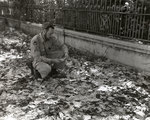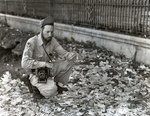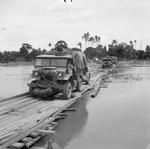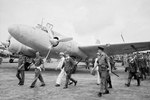18 Mar 1897
Burma
Burma
- Gordon Seagrave was born in Rangoon, Burma. ww2dbase [Gordon Seagrave | Rangoon | CPC]
23 Dec 1941
Burma
Burma
- 54 Japanese bombers escorted by 24 fighters attacked Rangoon, Burma in the late morning, killing 1,250; of those who became wounded as the result of this raid, 600 died. ww2dbase [Invasion of Burma | Rangoon | CPC]
25 Dec 1941
Burma
Burma
- Archibald Wavell arrived in Rangoon, Burma by aircraft, landing amidst a Japanese air raid. The fighters that escorted the Japanese bombers were from the 64th Air Combat Group led by Major Tateo Kato. ww2dbase [Invasion of Burma | Archibald Wavell | Tateo Kato | Rangoon | CPC]
24 Jan 1942
Burma
Burma
- Japanese aircraft attacked Rangoon, Burma for the second day in a row. From the Thai-Burmese border, Japanese troops marched in multiple columns toward Moulmein, Burma, looking to capture the nearby airfield. ww2dbase [Invasion of Burma | Rangoon | CPC]
28 Feb 1942
Burma
Burma
- General Archibald Wavell, who believed Rangoon, Burma must be held, relieved Thomas Hutton for planning an evacuation. ww2dbase [Invasion of Burma | Rangoon | CPC]
6 Mar 1942
Burma
Burma
- Anglo-Indian and Japanese troops clashed at various roadblocks near Rangoon, Burma. ww2dbase [Invasion of Burma | Rangoon | CPC]
7 Mar 1942
Burma
Burma
- £11,000,000 worth of oil installations of Burmah Oil Company in southern Burma near Rangoon were destroyed as British retreated from the city, preventing Japanese capture; this destruction would result in 20 years of High Court litigation after the war. Also destroyed were 972 unassembled Lend-Lease trucks and 5,000 tires. From Rangoon, 800 civilians departed aboard transports for Calcutta, India. The Anglo-Indian troops in the Rangoon region were held up by a Japanese roadblock at Taukkyan, which was assaulted repeatedly without success. ww2dbase [Invasion of Burma | Rangoon | TH, CPC]
- The 382-ton British merchant ship Nyounghla was scuttled at Rangoon, Burma. ww2dbase [Rangoon | HM]
10 Mar 1942
Burma
Burma
- Japanese 55th Infantry Division began pursuing the retreating British troops from Rangoon, Burma. ww2dbase [Invasion of Burma | Rangoon | CPC]
3 Apr 1942
Burma
Burma
- Six B-17 bombers of the US 10th Air Force based in Asansol, India attacked Rangoon, Burma, setting three warehouses on fire; one aircraft was lost in this attack. ww2dbase [Invasion of Burma | Rangoon | CPC]
24 Jan 1943
Burma
Burma
- Satoru Anabuki, flying Ki-43 fighter "Fubuki", shot down a Wellington bomber over Rangoon, Burma, his 19th victory. ww2dbase [Satoru Anabuki | Rangoon | CPC]
8 Oct 1943
Burma
Burma
- Satoru Anabuki, flying Ki-43 fighter "Kimikaze", shot down a P-38 fighters and three B-24 bombers over Rangoon, Burma, increasing his score to 48. He was seriously wounded in combat. ww2dbase [Satoru Anabuki | Rangoon | CPC]
24 Apr 1945
Burma
Burma
- The final 50 troops of the all-female Rani of the Jhansi Regiment loyal to Indian nationalist and Japanese collaborator Subhas Chandra Bose withdrew from their base in Rangoon, Burma for Bangkok, Thailand. Two women were killed by a British advance patrol. ww2dbase [Battle of Rangoon | Rangoon | CPC]
1 May 1945
Burma
Burma
- Indian 50th Parachute Regiment was dropped near Rangoon, Burma as the spearhead to Operation Dracula. Meanwhile, determined to preempt Operation Dracula in the conquest of Rangoon, William Slim carelessly attempted to enter the city himself by air; his aircraft was damaged by Japanese anti-aircraft fire and the American pilot, Captain Robert Fullerton, sustained injuries in his leg so severe that it had to be amputated later. ww2dbase [Battle of Rangoon | Rangoon | CPC]
2 May 1945
Burma
Burma
- In Burma, Indian 26th Division and Indian 17th Division continued their competition to be the first division to reach Rangoon. The 26th Division made an amphibious landing near the city, while the 17th Division secured Pegu. The first individual to enter Rangoon, however, was an RAF officer who landed on a nearby airstrip on this date. He walked into the city and, having assured himself that the Japanese had really gone, sailed down the river in a commandeered sampan to meet the troops advancing from the south. ww2dbase [Battle of Rangoon | Rangoon | AC, CPC]
3 May 1945
Burma


Burma
- Rangoon, Burma was captured by Indian 26th Division with little resistance. Fleeing Japanese were slaughtered not just by British and Commonwealth troops but by Burmese guerrillas and tribesmen who rose up against their former occupiers. ww2dbase [Battle of Rangoon | Rangoon | AC]


16 Aug 1945
Burma
Burma
- A three-day conference of the Anti-Fascist People's Freedom League began at the Naythuyain Theater on Kandawgyi Lake in Rangoon, Burma. This was the first public meeting of this coalition of several anti-colonial organizations. The absence of Thakin Soe in this conference (who had been accused of bigamy by his political opponents) would give Aung San an opportunity to rise as the foremost leader of Burmese nationalists. ww2dbase [Aung San | Rangoon | CPC]
19 Aug 1945
Burma
Burma
- The first public conference of the Anti-Fascist People's Freedom League, which was held at the Naythuyain Theater on Kandawgyi Lake in Rangoon, Burma, came to a close. Aung San, who promised to unite the various anti-colonial groups in Burma, emerged the foremost leader of Burmese nationalists, especially as the communists broke away from the AFO. ww2dbase [Aung San | Rangoon | AC, CPC]
27 Aug 1945
Burma
Burma
- In Rangoon, Burma, Japanese delegates signed a preliminary agreement ordering local Japanese commanders to assist and obey British commanders of reoccupation forces. ww2dbase [Japan's Surrender | Rangoon | AC]
- Louis Mountbatten and Field Marshal Hisaichi Terauchi signed a preliminary surrender agreement in Rangoon, Burma. ww2dbase [Japan's Surrender | Louis Mountbatten | Rangoon | CPC]
1 Oct 1945
Burma
Burma
- Ethnic Karens in Burma began a three-day meeting in Rangoon, proposing a separate state for their people. They were fearing their ethnic identity in the face of the majority Burmese, which historically viewed Karens with hostility. The meeting was largely attended by members of the Karen Central Organization (a umbrella organization which loosely encompasses the following groups), Karen National Association (Christians), Burma Karen National Association (Buddhist), and the newly formed Karen Youth Organization (socialists). ww2dbase [Rangoon | CPC]
5 Nov 1954
Burma
Burma
- Japan and Burma signed a peace treaty in Rangoon, Burma. ww2dbase [San Francisco Peace Conference | Rangoon | CPC]
Please consider supporting us on Patreon. Even $1 per month will go a long way! Thank you. Please help us spread the word: Stay updated with WW2DB: |
Search WW2DB

News
- » US State Lawmaker John Winter Caught Using Racial Slur "Jap" and Apologized (11 Jun 2025)
- » Köln/Cologne Evacuated After Discovery of WW2 Bombs (4 Jun 2025)
- » US Women's Army Corps "Six Triple Eight" Awarded with Congressional Gold Medal (30 Apr 2025)
- » Race, Holocaust, and African-American WW2 Histories Removed from the US Naval Academy Library (7 Apr 2025)
- » US Government Plans to Purge WW2 Information (17 Mar 2025)
- » See all news
Current Site Statistics
- » 1,175 biographies
- » 337 events
- » 44,927 timeline entries
- » 1,245 ships
- » 350 aircraft models
- » 207 vehicle models
- » 376 weapon models
- » 123 historical documents
- » 261 facilities
- » 470 book reviews
- » 28,474 photos
- » 365 maps
Famous WW2 Quote
"Never in the field of human conflict was so much owed by so many to so few."Winston Churchill, on the RAF
Support Us
Please consider supporting us on Patreon. Even $1 a month will go a long way. Thank you!
Or, please support us by purchasing some WW2DB merchandise at TeeSpring, Thank you!

